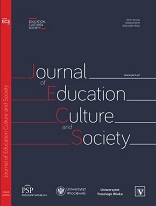Gender aspects of empathy in online learning of adolescents
Gender aspects of empathy in online learning of adolescents
Author(s): Nina Pidbutska, Yuliia Demidova, Anastasiia KnyshSubject(s): Social Sciences, Gender Studies, Sociology
Published by: Fundacja Pro Scientia Publica
Keywords: online learning;empathy;academic performance;adolescents;distance learning;education;personality development;
Summary/Abstract: Aim. The aim of the article is to present the results of a study of gender-related features of the connection between empathy and performance of adolescents during online learning. The main objectives of the study are as follows: defining criteria for online learning success; holding expert assessment of success of online learning of adolescents; studying correlation between the level of empathy and success of online learning in groups of male and female. Methods. The study participants consist of 50 teenagers from a secondary school in Kharkiv (Ukraine) and their 10 teachers. The study uses the following methods: 1) expert assessment; 2) psychological testing (Mehrabian and Epstein Questionnaire); 3) statistical methods. The following is used for statistical data processing: descriptive statistics methods (to measure the percentage of people with different levels of empathy and different levels of online learning performance); Pearson's χ2 consistency criterion- (to compare data distributions in groups of female and male participants by all study indicators); Spearman's correlation analysis (to investigate the correlation between the level of empathy and the level of successful performance of online learning of adolescents). Results. During the study, the aim has been achieved and all the objectives have been fulfilled, in particular: 1) “involvement in online learning” and "quality of online learning" are defined as criteria for online learning successful performance; 2) expert assessment of the study results is carried out, allowing us to determine that female participants show mainly medium and high levels of online learning performance, while male participants show low and medium-level results; 3) it is determined that the correlation between the level of performance of online learning and empathy in the group of girls is higher than in the group of boys. Conclusions. The study shows that the development of online courses requires not only the use of modern technological and methodological approaches, but also taking into account the gender-related and personal traits of students.
Journal: The Journal of Education, Culture, and Society
- Issue Year: 12/2021
- Issue No: 1
- Page Range: 314-321
- Page Count: 8
- Language: English

